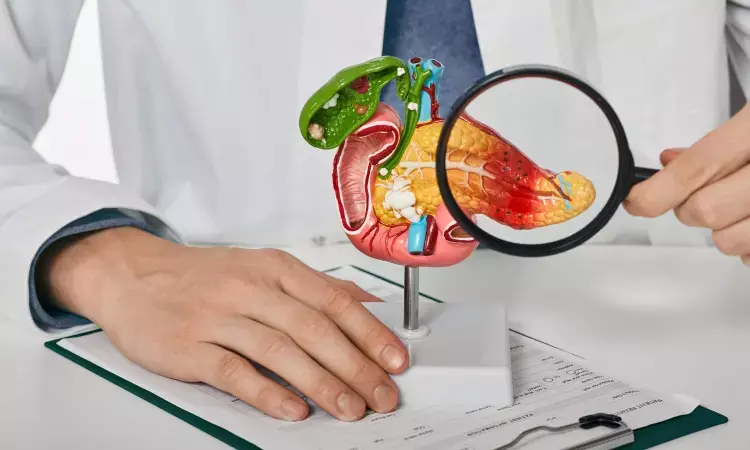- Home
- Medical news & Guidelines
- Anesthesiology
- Cardiology and CTVS
- Critical Care
- Dentistry
- Dermatology
- Diabetes and Endocrinology
- ENT
- Gastroenterology
- Medicine
- Nephrology
- Neurology
- Obstretics-Gynaecology
- Oncology
- Ophthalmology
- Orthopaedics
- Pediatrics-Neonatology
- Psychiatry
- Pulmonology
- Radiology
- Surgery
- Urology
- Laboratory Medicine
- Diet
- Nursing
- Paramedical
- Physiotherapy
- Health news
- Fact Check
- Bone Health Fact Check
- Brain Health Fact Check
- Cancer Related Fact Check
- Child Care Fact Check
- Dental and oral health fact check
- Diabetes and metabolic health fact check
- Diet and Nutrition Fact Check
- Eye and ENT Care Fact Check
- Fitness fact check
- Gut health fact check
- Heart health fact check
- Kidney health fact check
- Medical education fact check
- Men's health fact check
- Respiratory fact check
- Skin and hair care fact check
- Vaccine and Immunization fact check
- Women's health fact check
- AYUSH
- State News
- Andaman and Nicobar Islands
- Andhra Pradesh
- Arunachal Pradesh
- Assam
- Bihar
- Chandigarh
- Chattisgarh
- Dadra and Nagar Haveli
- Daman and Diu
- Delhi
- Goa
- Gujarat
- Haryana
- Himachal Pradesh
- Jammu & Kashmir
- Jharkhand
- Karnataka
- Kerala
- Ladakh
- Lakshadweep
- Madhya Pradesh
- Maharashtra
- Manipur
- Meghalaya
- Mizoram
- Nagaland
- Odisha
- Puducherry
- Punjab
- Rajasthan
- Sikkim
- Tamil Nadu
- Telangana
- Tripura
- Uttar Pradesh
- Uttrakhand
- West Bengal
- Medical Education
- Industry
Administration of Lactated Ringer's solution in first 24 hours of hospitalization may improve outcomes in Acute Pancreatitis

Recent pilot trials in acute pancreatitis (AP) found that lactated ringers (LR) usage may result in decreased risk of moderately severe/severe AP compared with normal saline, but their small sample sizes limit statistical power
In a recent study, researchers investigated whether lactated Ringer's (LR) solution improves outcomes in 999 patients with a history of acute pancreatitis (AP).
According to this study, using the LR solution during the first 24 hours of hospitalization is associated with reduced odds of moderately severe/severe AP compared with normal saline usage after adjusting for confounding variables.
According to a recent pilot trial, researchers have shown that in acute pancreatitis patients, lactated ringers (LR) decreases the risk of moderately severe/severe AP compared to normal saline. The main limitation of these studies is related to small sample sizes limiting statistical power.
In this study, the team investigated whether LR usage improves outcomes in AP in those patients enrolled at 22 international sites (2015 - 2018).
The key findings of the study are:
- The mean age of 999 patients was 51 years, including 52 % females and 24 % moderately severe/severe AP.
- Compared to normal saline, Using LR during the first 24 hours reduced the odds of moderately severe/severe AP (adjusting for the region of enrollment, aetiology, BMI, and fluid volume).
- The team observed similar results in sensitivity analyses eliminating the effects of admission organ failure, aetiology, and excessive total fluid volume.
They said, “Our study found that LR solution administration in the first 24 hours of hospitalization is tied to less severe AP.
This study, “Lactated Ringers Use in the First 24 Hours of Hospitalization Is Associated with Improved Outcomes in 999 Patients with Acute Pancreatitis”, led by Dr Lee, Peter J et al. and colleagues, is published in The American Journal of Gastroenterology.
Further investigations are warranted to confirm these findings in a large-scale randomized clinical trial.
Further reading:
https://journals.lww.com/ajg/Abstract/9900/Lactated_Ringers_Use_in_the_First_24_Hours_of.810.aspx
BDS, MDS in Periodontics and Implantology
Dr. Aditi Yadav is a BDS, MDS in Periodontics and Implantology. She has a clinical experience of 5 years as a laser dental surgeon. She also has a Diploma in clinical research and pharmacovigilance and is a Certified data scientist. She is currently working as a content developer in e-health services. Dr. Yadav has a keen interest in Medical Journalism and is actively involved in Medical Research writing.
Dr Kamal Kant Kohli-MBBS, DTCD- a chest specialist with more than 30 years of practice and a flair for writing clinical articles, Dr Kamal Kant Kohli joined Medical Dialogues as a Chief Editor of Medical News. Besides writing articles, as an editor, he proofreads and verifies all the medical content published on Medical Dialogues including those coming from journals, studies,medical conferences,guidelines etc. Email: drkohli@medicaldialogues.in. Contact no. 011-43720751


